- Home
- P. D. James
The Lighthouse Page 15
The Lighthouse Read online
Page 15
They watched as he strode vigorously over the bank and disappeared. Dalgliesh nodded to Kate. Opening her murder case, she put on her latex gloves, drew out a large exhibit-bag and, carefully lifting the rope from the hook, dropped it inside and sealed the bag. Taking a pen from her pocket, she glanced at her watch, then wrote the time and the bag contents on the label. Benton-Smith added his name. Maycroft and Staveley watched in silence, not meeting each other’s eyes, but Dalgliesh sensed a small tremor of unease, as if only now were they realising the full implications of why he and his colleagues were on the island.
Suddenly Staveley said, “I’d better get back to the house and make sure everyone’s in the library. Emily won’t come, but the rest should be there.”
Without waiting for a reply, he hurried out of the door and loped clumsily over the ridge with surprising speed. For a moment no one spoke. Then Dalgliesh turned to Rupert Maycroft. “I need the lighthouse to be locked. Is there a chance of finding the key?”
Maycroft was still staring after Staveley. He gave a start. “I could try. Up till now, of course, no one has bothered. I haven’t much hope. The key could have been lost years ago. Either Dan Padgett or Jago could probably replace the whole lock, but I doubt whether we’ve got one on the island strong enough for this door. It would take time. Failing that, they could fix strong external bolts, but that, of course, wouldn’t prevent people getting in.”
Dalgliesh turned to Benton. “Will you see to that, Sergeant, as soon as we’ve finished in the library? If we have to rely on bolts they’ll need to be taped. That too won’t prevent entry, but we’ll know if someone has broken in.”
“Yes, sir.”
For the moment they had finished with the lighthouse. It was time to make acquaintance with the residents of Combe.
6
* * *
They crossed a wide hall to the library door. Before opening it, Maycroft said, “Most of the present residents should be here, except for Miss Oliver and Mr. Tremlett. Obviously I haven’t bothered them. Miss Holcombe and Roughtwood are in Atlantic Cottage but will be available for interview later. When you’ve finished here I’ll try again to contact Dr. Speidel and Mark Yelland.”
They entered a room identical in shape and size to Maycroft’s office. Here again was the great curved window and the unrestricted view of sky and sea. But the room was unmistakably a library, with mahogany glass-fronted bookcases lining the other walls from the floor almost to the ceiling. To the right of the door the bookcase had been adapted to provide shelving for a collection of CDs. There were two high-backed leather chairs before the fireplace and others ranged around a large oblong table in the middle of the room. Here the company had seated itself, except for two women who had taken the armchairs and a younger, strongly built blonde who was standing looking out of the window. Guy Staveley was at her side. She turned as Dalgliesh and the little group entered, and fixed on him a frankly appraising look from remarkable eyes, the irises as richly brown as treacle.
Without waiting for an introduction, she said, “I’m Joanna Staveley. Guy deals with illness, I provide sticking plasters, laxatives and placebos. The surgery’s on the same floor as the sickroom if you need us.”
No one spoke. There was a low shuffle as the men at the table shifted their chairs as if to rise, then thought better of it. The heavy mahogany door had been too solid to allow any murmur of voices to reach the little group in the hall, but now the silence was complete and it was difficult to believe that it had ever been broken. All but one of the windows were closed, and once again Dalgliesh was consciously aware of the pounding of the sea.
Maycroft had obviously mentally rehearsed what he had to say and, although not totally at ease, he made the introductions with quiet confidence and more authority than Dalgliesh had expected. “This is Commander Dalgliesh from New Scotland Yard, and his colleagues Detective Inspector Miskin and Detective Sergeant Benton-Smith. They are here to investigate the circumstances of Mr. Oliver’s tragic death, and I have given Commander Dalgliesh an assurance that all of us will cooperate fully in helping him to establish the truth.” He turned to Dalgliesh. “And now I’d like to introduce my colleagues.” He nodded towards the two seated women. “Mrs. Burbridge is our housekeeper, in charge of all domestic arrangements, and Mrs. Plunkett is our cook.”
Mrs. Plunkett was a solid, plump-cheeked woman with a plain but pleasant face. She was wearing a white coat tightly buttoned over her broad frame. It was rigidly starched, and Dalgliesh wondered if she had put it on to proclaim unambiguously her place in the island hierarchy. Her dark hair with only the first flecks of grey lay in strong waves held back by a slide, a style Dalgliesh had seen pictured in photographs of the 1930s. She sat in apparently untroubled calm, her strong hands—the fingers round as sausages, the skin slightly red—resting in her capacious lap. Her eyes were small and very bright—but not, he thought, unfriendly—and were fixed on him with the experienced scrutiny of a cook assessing the potential merits and inadequacies of a prospective kitchen maid.
Mrs. Burbridge looked very much the doyenne of the house. She sat upright in her chair, as still as if posing for a portrait. She had a short compact body with a high full bust and delicate wrists and ankles. Her hands, pale and with the nails short and unpainted, lay unclasped, revealing no sign of strain. The steel-grey hair was neatly plaited and twisted into a bun at the top of her head; the sharp eyes fixed on Dalgliesh from behind silver-rimmed spectacles were more questioning than speculative. Her mouth was generous and firm, and he sensed that she held her authority lightly: one of those women who gained their own way less by insisting on it than by never imagining that it could ever be questioned.
The two women remained seated, but their faces creased briefly into considered and conditional smiles.
Maycroft turned his attention to the group at the table. “You’ve already met Jago Tamlyn. Jago not only acts as waterman responsible for the launch, but is a qualified electrician and maintains our generator, without which we should be cut off from the mainland with no light and no power. Next to Jago we have Adrian Boyde, my personal assistant, then Dan Padgett, the gardener and general handyman, and at the end Millie Tranter. Millie helps with the linen and in the kitchen.”
Dalgliesh didn’t intend the occasion to be portentous but he had no illusions. He knew that he couldn’t put them at ease and that any attempt could only be derisory. He didn’t come as a friend, and no formal regrets at Oliver’s death, no platitudes about regretting the inconvenience could disguise this uncomfortable truth. It was during the later, individual interviews that he expected to learn most, but if anyone had seen Oliver that morning, particularly if he had been making his way to the lighthouse, the sooner he was told the better. And there was another advantage in this group questioning. Statements openly made could be immediately queried or challenged, by look if not by word. His suspects might be more confiding later in private, but it was here together that their relationships were most likely to be revealed. And he needed to know, if possible, the precise time of death. He was confident that Dr. Glenister’s preliminary assessment would be proved accurate: Oliver had died at about eight o’clock that morning. But an interval of ten minutes could make the difference between an alibi that stood firm and one that could be challenged, between doubt and certainty, between innocence and guilt.
He said, “I or one of my officers will see you individually sometime later today or tomorrow. Perhaps you would let Mr. Maycroft know if you intend to leave this house or your quarters. But now that we’re together, I’m asking if anyone saw Mr. Oliver either after he left the dining room at about nine-fifteen last night, or at any time this morning.”
There was a silence. Their eyes slewed round the group, but at first no one spoke. Then Mrs. Plunkett broke the silence. “I saw him at dinner. He left when I went into the dining room to start clearing the main course. I served coffee as usual at nine-thirty here in the library, but he didn’t return. Dinner w
as the last I saw of him. This morning I’ve been busy in my kitchen getting Mr. Maycroft’s breakfast and preparing lunch.” She paused, then added, “No one wanted it, which was a pity because it was salmon en croûte. No point in trying to heat that up later. Bit of a waste, really. Sorry I can’t help.”
She glanced at Mrs. Burbridge as if conveying a signal. Mrs. Burbridge followed. “I had dinner in my own flat and then read until ten-fifteen, when I went to get a last breath of fresh air. I saw no one. The wind had got up and was gusting harder than I’d expected, so I didn’t stay out for more than fifteen minutes. This morning I was in my flat, mostly in my sewing room, until Mr. Maycroft telephoned to tell me that Mr. Oliver had been found hanged.”
Kate asked, “Last night you went in which direction?”
“To the lighthouse and back, along the top cliff. It’s a walk I often take before bed. As I said, I saw no one.”
Adrian Boyde was sitting in disciplined calm, his shoulders slightly hunched, his hands under the table. Of those seated with him, he, who had been spared the sight of Oliver’s hanging body, looked the most distressed. His face, drained of colour, glistened with sweat, the single strand of very dark hair plastered damply across his forehead looked as theatrically black as if it had been dyed. He had been staring down at his hands but now raised his eyes and gazed fixedly at Dalgliesh.
“I ate supper alone in my cottage and I didn’t go out afterwards. This morning I left early for work—just before eight—and walked across the island, but I didn’t see anyone until Mr. Maycroft arrived and joined me in the office at about twenty past nine.”
Now they looked at Dan Padgett. His pale fear-filled eyes flickered round as if seeking assurance that it was his time to speak. He sucked in his lips. The others waited. The words, when they came, were brief and spoken with a forced bravado that sounded embarrassingly hostile. Dalgliesh was too experienced to assume that fear implied guilt; it was often the most innocent who were the most terrified by a murder inquiry. But he was interested in the reason for it. He had already sensed that the general dislike of Oliver had a deeper cause than his disagreeable personality or arguments about accommodation. Miss Emily Holcombe, with the prestige of her name, could no doubt stand up to Oliver. He was looking forward to interviewing Miss Holcombe. Had Padgett perhaps been a more vulnerable victim?
Now Padgett said, “I had a walk before supper, but I was in my cottage by eight o’clock and I didn’t go out again. I didn’t see Mr. Oliver last night or this morning.”
Millie said, “Nor me neither,” and looked across at Kate as if challenging her to say otherwise. Dalgliesh thought it surprising that someone who looked hardly older than a child should choose or have been chosen to work on Combe. Surely this small, isolated and sedulously controlled island would be anathema to most teenagers. She was wearing a very short jacket in faded blue denim much ornamented with badges, and constantly fidgeted in her chair, so that from time to time he could glimpse a narrow strip of delicate young flesh between the jacket hem and the top of her jeans. Her fair hair was combed back into a ponytail, and strands from an undisciplined fringe half obscured a sharp-featured face and small restless eyes. There was no sign of her recent distress, and the small mouth was fixed in an expression of sulky belligerency. He judged that now was not the most propitious time to question Millie further, but with tactful handling and in private she might prove more informative than her elders.
Their eyes turned to Jago. He said, “Seeing as Mr. Oliver was alive and well at dinner, you’ll not be interested in Friday afternoon. I had supper in my cottage. Sausages and mash, if you’re interested. This morning I took the launch out for forty minutes or so to test the engine. She’s been giving a bit of trouble. That took from seven-forty-five until twenty past eight, near enough.”
Kate asked, “Where did you go? I mean, in which direction?”
Jago looked at her as if the question had been incomprehensible. “Straight out and straight back, miss. It wasn’t a pleasure cruise.”
Kate kept her temper. “Did you go past the lighthouse?”
“I wouldn’t, would I, not going straight out to sea and back?”
“But you could see the lighthouse?”
“I would’ve done if I’d been looking that way, but I wasn’t.”
“It’s hardly inconspicuous, is it?”
“I was busy with the launch. I saw nothing and nobody. I was back in my cottage alone until Millie arrived at about half-past nine. The next excitement was Mr. Boyde ringing to tell me that Mr. Oliver was missing and asking me to join the search. I’ve told you the rest.”
Millie broke in. “You said you weren’t going out to test the launch until half-past nine. You promised to take me with you.”
“Well, I changed my mind. And it wasn’t a promise, Millie.”
“You didn’t even want me to go with you on the search. You told me to stay in the cottage. I don’t know what made you so angry.” She looked close to tears.
Neither Staveley nor his wife had chosen to sit. Watching them still standing together at the window, Dalgliesh was struck by their disparity. The impression Guy Staveley gave of an internal tension, disciplined by a cultivated ordinariness, emphasised his wife’s flamboyant vitality. She was only an inch shorter than her husband, full-breasted with long legs. Her blonde hair, dark at the roots, as thick as his was sparse, was caught up in two red combs. Some yellow strands lay curled across her forehead and framed a face on which the first ravages of time strengthened rather than diminished her assured femininity. It would be easy to see her as a type, the handsome, sexually demanding woman dominating a weaker and ineffectual husband. Dalgliesh, always wary of stereotypes, thought that the reality might be subtler and more interesting. It might also be more dangerous. Of all the people in the room, she was the most at ease. She had changed for this encounter into something more formal than she would surely normally choose to wear on a working day. The cream quilted jacket worn above narrowly cut black trousers held the sheen of silk. She wore it open to reveal a black tee-shirt, the neck low enough to show the cleavage of her breasts.
She said, “You’ve met my husband, of course, when you went to the scene of crime. Or isn’t suicide a crime any more? Assisted suicide is, though, isn’t it? I don’t suppose Oliver needed any assistance. That’s one thing he had to do for himself.”
Kate said, “Could you answer the question, Mrs. Staveley?”
“I was with my husband at dinner here last night. Both of us stayed for coffee in the library. We went back to Dolphin Cottage and we were together until we went to bed, just before eleven. Neither of us left our cottage. I don’t share this passion for fresh air before bed. We breakfasted together in the cottage—grapefruit, toast and coffee—and then I came out to the surgery to wait for Oliver. He was due to give blood at nine. When he hadn’t arrived by nine-twenty, I began ringing round to find out what was keeping him. He was an obsessive, and, despite his dislike of the needle, I expected him either to phone and cancel or to be punctual. I didn’t join in the search but my husband did. The first I knew what had happened was when Guy came back to tell me. But you know all about that.”
Dalgliesh said, “It’s helpful to hear it from you.”
She smiled. “My account would hardly differ from my husband’s. We had plenty of time before you arrived if we wanted to fabricate an alibi.”
It was obvious that her frankness had embarrassed the company. In the silence that followed, a small tremor of shock was almost audible. They were careful not to meet each other’s eyes.
Then Mrs. Burbridge spoke. “But surely we aren’t here to provide each other with alibis? You don’t need an alibi for a suicide.”
Jago broke in. “And you don’t get a top copper from the Met Police arriving by chopper either. What’s wrong with the Cornish police? I reckon they’re competent to investigate a suicide.” He paused, then added, “Or murder too, for that matter.”
All eyes
turned to Dalgliesh. He said, “No one is questioning local competence. I’m here with the agreement of the Cornish Constabulary. They’re hard-pressed, as almost all police forces are. And it’s important to clear this matter up as quickly as possible with the minimum of publicity. At present what I’m investigating is a suspicious death.”
Mrs. Burbridge said gently, “But Mr. Oliver was an important man, a famous author. People talk of his getting the Nobel Prize. You can’t hide death, not this death.”
Dalgliesh said, “We’re not hiding it, only attempting to explain it. The news has already been communicated to Mr. Oliver’s publishers and will probably be on tonight’s TV and radio news and perhaps in tomorrow’s papers. No journalist will be allowed to land on the island, and inquiries will be dealt with by the Metropolitan Police public-relations branch.”
Maycroft looked at Dalgliesh, then as if on cue said, “There is bound to be speculation, but I hope none of you will add to it by communicating with the outside world. Men and women with great responsibilities come here to find solitude and peace. The Trustees want to ensure that they can still find that solitude and that peace. The island has fulfilled what the original donor intended, but only because the people who work here—all of you—are dedicated, loyal and completely discreet. I’m asking you to continue that loyalty and that discretion and help Mr. Dalgliesh to get to the truth of Mr. Oliver’s death as soon as possible.”
It was then that the door opened. All eyes turned to the newcomer. He walked with quiet confidence and took one of the empty chairs at the table.
Dalgliesh was surprised, as he often was when meeting a distinguished scientist, at how young Yelland looked. He was tall—over six feet—with fair curly hair whose length and unruliness emphasised the appearance of youth. A handsome face was saved from the insipidity of conventional good looks by the jutting jaw and the firm set of the thin-lipped mouth. Dalgliesh had seldom seen a face so ravaged by exhaustion or so stamped with the prolonged endurance of responsibility and overwork. But there was no mistaking the man’s authority.

 The Skull Beneath the Skin
The Skull Beneath the Skin A Taste for Death
A Taste for Death The Children of Men
The Children of Men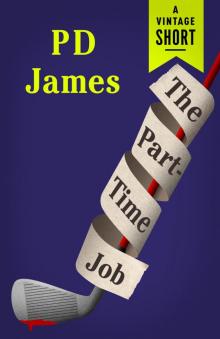 The Part-Time Job
The Part-Time Job Death in Holy Orders
Death in Holy Orders The Victim
The Victim Shroud for a Nightingale
Shroud for a Nightingale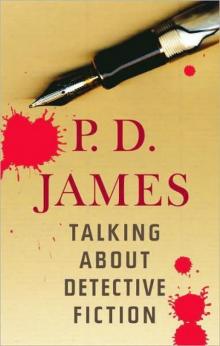 Talking about Detective Fiction
Talking about Detective Fiction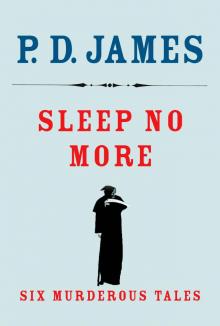 Sleep No More
Sleep No More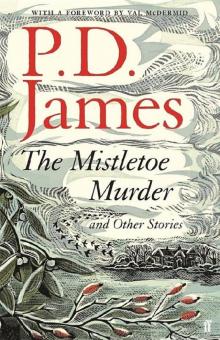 The Mistletoe Murder and Other Stories
The Mistletoe Murder and Other Stories Time to Be in Earnest
Time to Be in Earnest Original Sin
Original Sin A Mind to Murder
A Mind to Murder Cover Her Face
Cover Her Face Innocent Blood
Innocent Blood Devices and Desires
Devices and Desires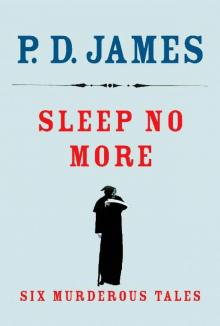 Sleep No More: Six Murderous Tales
Sleep No More: Six Murderous Tales Death Comes to Pemberley
Death Comes to Pemberley The Mistletoe Murder
The Mistletoe Murder Death of an Expert Witness
Death of an Expert Witness The Private Patient
The Private Patient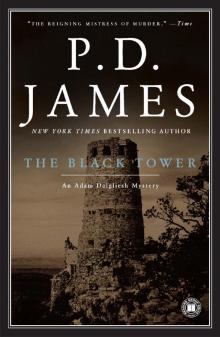 The Black Tower
The Black Tower Devices & Desires - Dalgleish 08
Devices & Desires - Dalgleish 08 Unnatural Causes
Unnatural Causes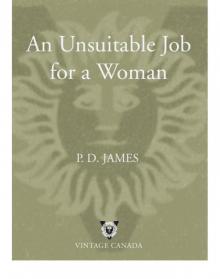 An Unsuitable Job for a Woman
An Unsuitable Job for a Woman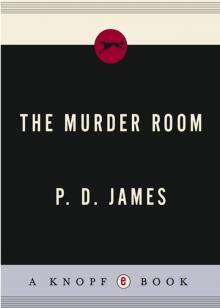 The Murder Room
The Murder Room A Certain Justice
A Certain Justice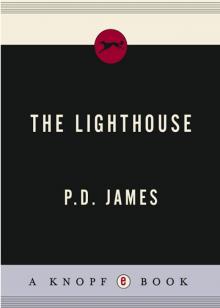 The Lighthouse
The Lighthouse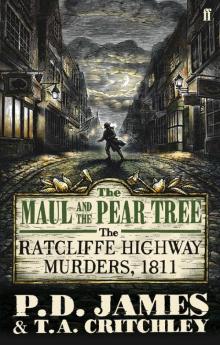 The Maul and the Pear Tree
The Maul and the Pear Tree